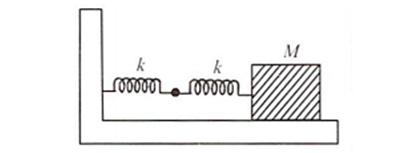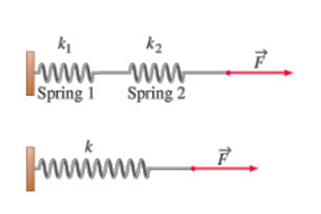 Multiple Choice Questions
Multiple Choice QuestionsIn an orbital motion, the angular momentum vector is
along the radius vector
parallel to the linear momentum
in the orbital plane
perpendicular to the orbital plane
The direction of the angular velocity vector is along
the tangent to the circular path
the inward radius
the outward radius
the axis of rotation
A bomb of mass 3.0 kg in air into two pieces of masses 2.0 kg and 1.0 kg. The smaller mass goes at speed of 80 m/s. The total energy imparted to the two fragments is
1.07 kJ
2.14 kJ
2.4 kJ
4.8 kJ
Using mass (M), length (L), time (T) and current (A) as fundamental quantities, the dimension of permittivity is
[ M L-2 T2 A ]
[ M-1 L-3 T4 A2 ]
[ M L T-2 A ]
[ M L2 T-1 A2 ]
Assertion: The driver in a vehicle moving with a constant speed on a straight road is in a noninertial frame of reference.
Reason: A reference frame in which Newton's laws of motion are applicable is non-inertial.
If both assertion and reason are true and reason is the correct explanation of assertion
If both assertion and reason are true but reason is not the correct explanation of assertion
If assertion is true but reason is false
If both assertion and reason are false
The waves produced by a motorboat sailing in water are
transverse
longitudinal
longitudinal and transverse
stationary
A sphere of mass Mand radius R is falling in a viscous fluid. The terminal velocity attained by the falling object will be proportional to
R2
R
1/R
1/R2
Two springs are connected to a block mass M placed on a frictionless surface as shown in figure. If both the springs have a spring constant k, the frequency of oscillation of the block is

![]()
![]()
![]()
![]()
B.
![]()

This system of two springs in series is equivalent to a single spring, of spring constant k. The value of k can be found from the formula that applies to a capacitor connected in series in an electrical circuit.
For spring 1, from Hooke's law
F = k1x1
x1 is the deformation of spring
F = k2x2
Total deformation of the system
x1 + x2 = ![]()
⇒ x1 + x2 = F ![]()
By rewriting and compairing with Hooke's law we get
k = ![]()
The spring constant of spring connected in series is equal to
ks = ![]()
= ![]() ( for k1 = k2 = k )
( for k1 = k2 = k )
The frequency of oscillation of given systems
f = ![]()
Suppose the sun expands so that its radius becomes 100 times its present radius and its surface temperature becomes half of its present value. The total energy emitted by it then will increase by a factor of
104
625
256
16
